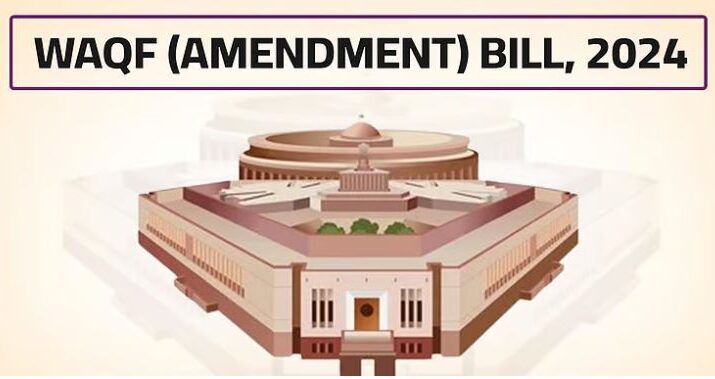New Delhi: The government plans to present the Waqf (Amendment) Bill, 2024, in Parliament on Wednesday. The Bill aims to enhance the administration and management of Waqf properties in India, addressing the limitations of the previous legislation. A statement released by the government in September of last year indicated that the Bill intends to improve the efficiency of Waqf boards by implementing changes such as revising the definition of Waqf, streamlining the registration process, and increasing the use of technology in managing Waqf records.
Since its introduction, the Bill has faced widespread criticism, particularly from Muslim organizations, including the All India Muslim Personal Law Board (AIMPLB), which have organized protests against it.
Among the most controversial aspects of the Bill are provisions that would permit a non-Muslim to serve as the Chief Executive Officer of a Waqf board, require state governments to appoint at least two non-Muslim members to their respective Waqf boards, empower the District Collector to decide whether a disputed property is Waqf or government-owned, eliminate the concept of “Waqf by user,” mandate that all Waqf properties be registered in a central database within six months of the law’s enactment, and remove the clause that made tribunal decisions final.
War over Waqf bill: Lok Sabha gears up for heated 8-hour debate
The Bill was first introduced in Parliament last year amidst significant opposition uproar and was later referred to a Joint Committee of Parliament, chaired by BJP MP Jagadambika Pal, for examination. On February 13, the committee submitted its report, which received approval from the Union Cabinet on February 19. However, Opposition members within the committee expressed concerns that their proposed amendments were dismissed and that their dissent notes were omitted from the report without their consent. The committee accepted 14 amendments suggested by NDA MPs while reportedly rejecting all 44 amendments proposed by the Opposition.
The proceedings of the panel leading up to the report were tumultuous. TMC MP Kalyan Banerjee faced a one-day suspension for disrupting the panel’s activities and for breaking a bottle on the table during one of its sessions. Six Opposition MPs—Banerjee, Asaduddin Owaisi (AIMIM), Mohammad Jawed (Congress), Sanjay Singh (AAP), Mohammed Nadimul Haque (TMC), and M M Abdulla (DMK)—sent a letter to Lok Sabha Speaker Om Birla, accusing Pal of “bulldozing the proceedings” of the panel.
In their letter, the Opposition members expressed their belief that the panel, which they referred to as a mini Parliament, should not merely serve as a platform for the government to push the Bill through while disregarding the parliamentary process by leveraging an alleged ‘majority’ in an undemocratic manner. They emphasized that it was their responsibility to highlight the troubling nature of bypassing the parliamentary committee’s proceedings without allowing adequate time for discussion, which they deemed a severe violation of constitutional principles and parliamentary integrity.
Prior to the panel’s final meeting on January 30, BJP MP Nishikant Dubey, in a media interview, dismissed these concerns, asserting that the panel had effectively addressed all issues related to the Bill, which aimed to “integrate Muslims into the mainstream.”
Waqf Amendment Bill: How numbers stack up in Parliament
Regarding the numbers, in the Lok Sabha, the NDA, along with its allies TDP and JD(U), appears to have sufficient support to ensure the Bill’s passage.
In the Rajya Sabha, which comprises 245 members, the NDA holds 125 seats. With nine positions currently vacant, the NDA requires the backing of 118 MPs to secure the Bill’s approval, which it possesses.
While the BJP has instructed all its Lok Sabha MPs to be present in the House on Wednesday, the Opposition INDIA bloc convened a meeting on Tuesday evening to strategize their approach for the Bill’s introduction in Parliament.




